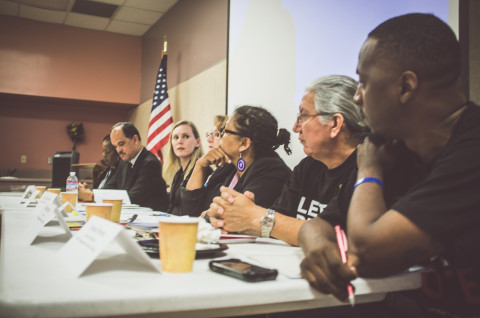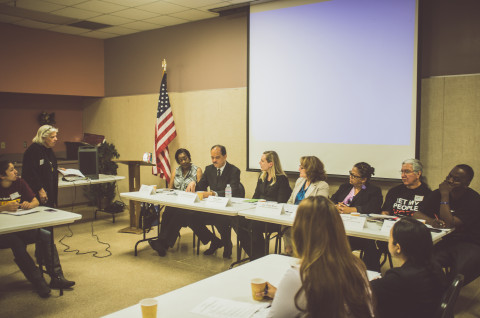
On Thursday, June 11, 2015, New America Media and Californians for Safety and Justice organized a media briefing on Proposition 47 in San Bernardino, Calif. Panelists from local law offices and community organizations explained how Prop 47 could potentially provide relief for an estimated 1 million Californians by helping to reduce their felony convictions to misdemeanors. Photo: CHRISTIAN MENDEZ/ Coachella Unincorporated
CHRISTIAN MENDEZ / Coachella Unincorporated
SAN BERNARDINO — The clock is ticking for an estimated 1 million Californians to get their felonies reduced to misdemeanors.
Proposition 47, the Safe Neighborhood and Schools Act, was passed in November 2014. The law allows California residents who have been convicted of simple drug possession, property crime under $950, or other nonviolent offenses to change their felonies to misdemeanors. Doing so will provide access to jobs, educational loans and housing assistance previously unavailable to individuals with a felony on their record.
But time is running out. Prop 47 is only a three-year program, and eight months have already passed, leaving community advocates and public defenders scrambling to spread the word.
“A million people can be affected by Prop 47, a million people that are back in the game, back in line,” Vonya Quarles, executive director of Starting Over, Inc., told reporters at an ethnic news briefing in San Bernardino last week hosted by New America Media, in partnership with Californians for Safety and Justice.
Quarles told reporters that Prop 47 will not only help convicted felons, but will also give their families a second chance.
“There are a lot of children today who have parents who have been incarcerated, or who are currently incarcerated, who will believe that’s the way their life will be if we do not take steps to show [the children] a different way,” Quarles said. “Prop 47 is a door opener. It will take a person who was convicted of a felony, reduce them of that burden and allow them to move forward, changing the economic conditions of the family and the lifestyle.”
Milena Blake, policy director for Californians for Safety and Justice, said Prop 47 aims to reduce California’s overcrowded prisons by allowing certain nonviolent felons who have applied for resentencing to be released. Blake added that the overwhelming support for the proposition – 60 percent of voters voted ‘Yes’ for Prop 47 – shows that, “Voters are saying we need to make a change.”

Attorney Russell M. Jauregui describes how Prop. 47 could potentially provide relief for undocumented immigrants facing deportation at a media briefing hosted by New America Media and Californians for Safety and Justice in San Bernardino, Calif. on Thursday, June 11, 2015. Photo: CHRISTIAN MENDEZ / Coachella Unincorporated
When Prop 47 was passed in October 2014, the population of inmates in California prisons was at 136,080. Since then that figure has fallen by 5 percent, representing a savings of nearly $400 million for the state.
Under Prop. 47, money saved from reductions in the prison population will be reinvested into the Safe Neighborhoods and Schools Fund, which will direct those funds into substance abuse and mental health treatment programs, as well as K-12 crime prevention and education programs for at-risk students, beginning in 2016.
Terrance Stewart is a community organizer with the faith-based group Inland Congregations United for Change. He says because of a felony on his record, he was denied access to subsidized housing in San Bernardino after being released from prison, despite the fact that he had turned his life around and was in the middle of completing a Master’s degree.
It’s a challenge, he added, that many in the black community face.
“I am African American, so that gives me a one in three chance of going to jail, especially over drug charges,” Stewart said, referring to rates of incarceration for African American men. “We look at it as numbers, but that is my people, my cousin, my uncle, my step grandfather, they have names.”
Prop 47 could also provide additional relief for undocumented immigrants, according to attorney Russell M. Jauregui. Reducing a felony to a misdemeanor could help undocumented immigrants avoid deportation proceedings that might have been initiated as a result of their criminal record, and could also benefit those currently excluded from DACA, which allows those who came to the United States as children to apply for temporary relief from deportation.
Jauregui stressed, however, that as the law is still new, immigrants looking to take advantage of it should first consult with an attorney.
Individuals interested in applying for reclassification or resentencing can visit the myprop47.org web site for step-by-step instructions on how to apply. All applicants must first have access to their California state criminal record before filling out the necessary forms.
Starting Over, Inc. and All of Us or None are hosting reclassification clinics every second Friday of the month at Universalist Unitarian Church, located at 3657 Lemon Street, Riverside, Calif. Attendees should bring copies of their criminal records to expedite the process. (http://myprop47.org/events/prop-47-reclassification-clinics-second-friday-of-the-month/)